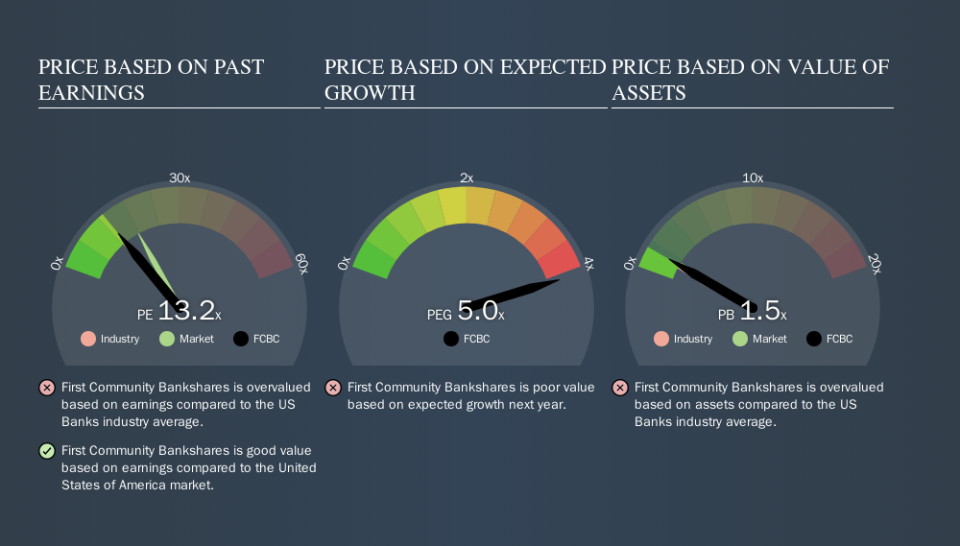What Does First Community Bankshares, Inc.'s (NASDAQ:FCBC) P/E Ratio Tell You?

This article is written for those who want to get better at using price to earnings ratios (P/E ratios). To keep it practical, we'll show how First Community Bankshares, Inc.'s (NASDAQ:FCBC) P/E ratio could help you assess the value on offer. What is First Community Bankshares's P/E ratio? Well, based on the last twelve months it is 13.15. That is equivalent to an earnings yield of about 7.6%.
See our latest analysis for First Community Bankshares
How Do I Calculate A Price To Earnings Ratio?
The formula for P/E is:
Price to Earnings Ratio = Share Price ÷ Earnings per Share (EPS)
Or for First Community Bankshares:
P/E of 13.15 = $32.01 ÷ $2.43 (Based on the year to September 2019.)
Is A High P/E Ratio Good?
A higher P/E ratio means that buyers have to pay a higher price for each $1 the company has earned over the last year. That isn't necessarily good or bad, but a high P/E implies relatively high expectations of what a company can achieve in the future.
How Does First Community Bankshares's P/E Ratio Compare To Its Peers?
We can get an indication of market expectations by looking at the P/E ratio. You can see in the image below that the average P/E (12.4) for companies in the banks industry is roughly the same as First Community Bankshares's P/E.
That indicates that the market expects First Community Bankshares will perform roughly in line with other companies in its industry. The company could surprise by performing better than average, in the future. Checking factors such as director buying and selling. could help you form your own view on if that will happen.
How Growth Rates Impact P/E Ratios
Probably the most important factor in determining what P/E a company trades on is the earnings growth. Earnings growth means that in the future the 'E' will be higher. That means even if the current P/E is high, it will reduce over time if the share price stays flat. And as that P/E ratio drops, the company will look cheap, unless its share price increases.
It's nice to see that First Community Bankshares grew EPS by a stonking 45% in the last year. And it has bolstered its earnings per share by 13% per year over the last five years. So we'd generally expect it to have a relatively high P/E ratio.
Don't Forget: The P/E Does Not Account For Debt or Bank Deposits
The 'Price' in P/E reflects the market capitalization of the company. In other words, it does not consider any debt or cash that the company may have on the balance sheet. Hypothetically, a company could reduce its future P/E ratio by spending its cash (or taking on debt) to achieve higher earnings.
While growth expenditure doesn't always pay off, the point is that it is a good option to have; but one that the P/E ratio ignores.
First Community Bankshares's Balance Sheet
With net cash of US$181m, First Community Bankshares has a very strong balance sheet, which may be important for its business. Having said that, at 36% of its market capitalization the cash hoard would contribute towards a higher P/E ratio.
The Bottom Line On First Community Bankshares's P/E Ratio
First Community Bankshares's P/E is 13.2 which is below average (17.8) in the US market. Not only should the net cash position reduce risk, but the recent growth has been impressive. One might conclude that the market is a bit pessimistic, given the low P/E ratio.
When the market is wrong about a stock, it gives savvy investors an opportunity. If the reality for a company is not as bad as the P/E ratio indicates, then the share price should increase as the market realizes this. So this free visualization of the analyst consensus on future earnings could help you make the right decision about whether to buy, sell, or hold.
Of course, you might find a fantastic investment by looking at a few good candidates. So take a peek at this free list of companies with modest (or no) debt, trading on a P/E below 20.
We aim to bring you long-term focused research analysis driven by fundamental data. Note that our analysis may not factor in the latest price-sensitive company announcements or qualitative material.
If you spot an error that warrants correction, please contact the editor at editorial-team@simplywallst.com. This article by Simply Wall St is general in nature. It does not constitute a recommendation to buy or sell any stock, and does not take account of your objectives, or your financial situation. Simply Wall St has no position in the stocks mentioned. Thank you for reading.

 Yahoo Movies
Yahoo Movies 

